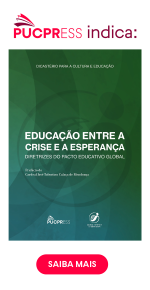The significance of Luther for the crises of today: On the occasion of the 500 years of the Reformation
DOI:
https://doi.org/10.7213/2175-1838.09.002.DS03Palavras-chave:
Luther, Reformation, Migration, Oeconomia, Capitalism, Coram deo/mundoResumo
The 500 anniversary of the event that marks the beginning of the Reformation is an opportunity to revisit some of its radical claims. Among them is that liberation and salvation are related but distinct. As long as we honor the distinction, honored will be the shape Luther’s figure is transfigured into the mold of contemporary crises. It is about presence, regardless of the fact whether Luther is named or not. At the break of the 21st century, the most significant social phenomenon is arguably migration. The Reformer viewed migration in two diametrically different ways. This difference pertains to the two perspectives that inform Luther’s theology. One pertains to our relationship to God and detachment from the entrapments of the world. The other refers to our life
in the world, particularly as it concerns the economy. About a century and a half ago, in the high of industrial capitalism, Karl Marx found in Luther the basic clue to analyze the emergence of capital. This article presents thus an analysis of a treatise of Luther on usury that Marx discusses at length in the first volume of Das Kapital. As it was for Marx, Luther’s transfiguration happens in the voices of protest and resistance today.
Downloads
Métricas
Referências
BAYER, O. “Nature and Institution: Luther’s Doctrine of the Three Orders,” Lutheran Quarterly 12, 1998.
ELERT, W. Morphologie des Luthertums, 2 vols. Munich: Beck, 1932.
KNAAKE, J. F. K. et alii (eds.). Luthers Werke [LW]: Schriften, Kritische Gesamtausgabe, 65 vols. Weimer: H. Böhlau, 1883-1993.
KOLB, Robert; WENGERT, Timothy (eds.). Book of Concord [BoC]. Minneapolis: Fortress, 2000.
MARX, K. Das Kapital. Berlin: Dietz-Verlag, 1951.
MARX, K. Grundrisse der Kritik der politischen Ökonomie. Berlin: Dietz-Verlag, 1953.
MÜHLEN, K.-H. “Arbeit IV: Reformation und Orthodoxie,” Theologische Realenzyklopädie, 3 vols. Berlin: De Gruyter, 1978.
PELIKAN, Jaroslav; LEHMAN, Helmut T.; BROWN, Christopher B. (eds.). Luther’s Works [LW]. St. Louis / Concordia / Philadelphia: Fortress & American Edition, 76 vols. 1955ff.
TAWNEY, R. H. Religion and the Rise of Capitalism: A Historical Study. New York: New American Library, 1954.
WEBER, M. Protestant Ethic and the Spirit of Capitalism, trans. Talcott Parsons. New York: Scribner’s, 1958.
WESTHELLE, V. Transfiguring Luther: The Planetary Promise of Luther’s Theology. Eugene, OR: Cascade, 2016.
Downloads
Publicado
Como Citar
Edição
Seção
Licença
O(s) autor(es) transfere(m), por meio de cessão, à EDITORA UNIVERSITÁRIA CHAMPAGNAT, pessoa jurídica de direito privado, inscrita no CNPJ/MF sob o n.º 76.659.820/0009-09, estabelecida na Rua Imaculada Conceição, n.º 1155, Prado Velho, CEP 80.215-901, na cidade de Curitiba/PR, os direitos abaixo especificados e se compromete a cumprir o que segue:
- Os autores afirmam que a obra/material é de sua autoria e assumem integral responsabilidade diante de terceiros, quer de natureza moral ou patrimonial, em razão de seu conteúdo, declarando, desde já, que a obra/material a ser entregue é original e não infringe quaisquer direitos de propriedade intelectual de terceiros.
- Os autores concordam em ceder de forma plena, total e definitiva os direitos patrimoniais da obra/material à EDITORA UNIVERSITÁRIA CHAMPAGNAT, a título gratuito e em caráter de exclusividade.
- A CESSIONÁRIA empregará a obra/material da forma como melhor lhe convier, de forma impressa e/ou on line, inclusive no site do periódico da EDITORA UNIVERSITÁRIA CHAMPAGNAT, podendo utilizar, fruir e dispor do mesmo, no todo ou em parte, para:
- Autorizar sua utilização por terceiros, como parte integrante de outras obras.
- Editar, gravar e imprimir, quantas vezes forem necessárias.
- Reproduzir em quantidades que julgar necessária, de forma tangível e intangível.
- Adaptar, modificar, condensar, resumir, reduzir, compilar, ampliar, alterar, mixar com outros conteúdos, incluir imagens, gráficos, objetos digitais, infográficos e hyperlinks, ilustrar, diagramar, fracionar, atualizar e realizar quaisquer outras transformações, sendo necessária a participação ou autorização expressa dos autores.
- Traduzir para qualquer idioma.
- Incluir em fonograma ou produção audiovisual.
- Distribuir.
- Distribuir mediante cabo, fibra ótica, satélite, ondas ou qualquer outro sistema que permite ao usuário realizar a seleção da obra ou produção para recebê-la em tempo e lugar previamente determinados por quem formula a demanda e nos casos em que o acesso às obras ou produções se faça por qualquer sistema que importe em pagamento pelo usuário.
- Incluir e armazenar em banco de dados, físico, digital ou virtual, inclusive nuvem.
- Comunicar direta e/ou indiretamente ao público.
- Incluir em base de dados, arquivar em formato impresso, armazenar em computador, inclusive em sistema de nuvem, microfilmar e as demais formas de arquivamento do gênero;
- Comercializar, divulgar, veicular, publicar etc.
- Quaisquer outras modalidades de utilização existentes ou que venham a ser inventadas.
- Os autores concordam em conceder a cessão dos direitos da primeira publicação (ineditismo) à revista, licenciada sob a CREATIVE COMMONS ATTRIBUTION LICENSE, que permite o compartilhamento do trabalho com reconhecimento da autoria.
- Os autores autorizam a reprodução e a citação de seu trabalho em repositórios institucionais, página pessoal, trabalhos científicos, dentre outros, desde que a fonte seja citada.
- A presente cessão é válida para todo o território nacional e para o exterior.
- Este termo entra em vigor na data de sua assinatura e é firmado pelas partes em caráter irrevogável e irretratável, obrigando definitivamente as partes e seus sucessores a qualquer título.
- O não aceite do artigo, pela EDITORA UNIVERSITÁRIA CHAMPAGNAT, tornará automaticamente sem efeito a presente declaração.



